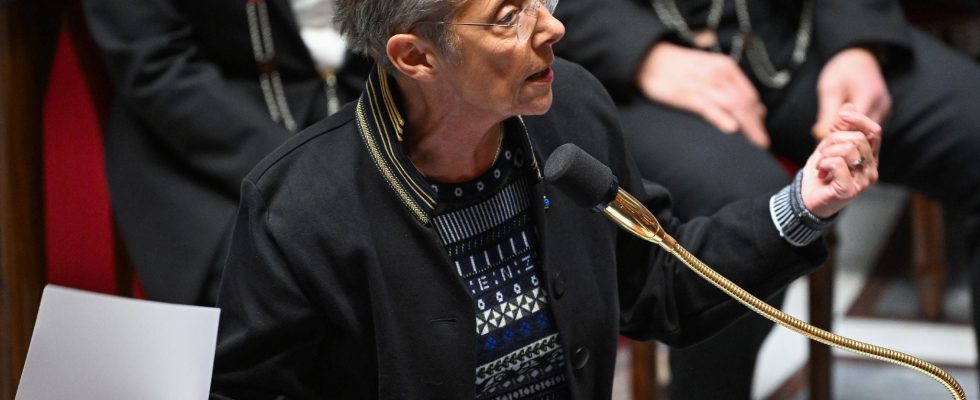All that was missing were the violins. This Wednesday, December 20, Olivier Véran sends a message to foreigners in France, the day after the vote on the immigration bill. “We know what we owe you. We know what you bring to our country. […] This law is also yours. Setting a clear framework means leaving the shores of prejudices and silencing fears,” says the government spokesperson during a press briefing. The former socialist admits “that there are things in this law that we don’t like […] but which does not dishonor us”. A few minutes earlier, Emmanuel Macron assured in the Council of Ministers that he did not like certain “things” in a text which does not go against “our values”. Questioned on France 5, the head of the The State has criticized the deposit required from foreign students as “not a good idea”.
We must free ourselves from the arms of the extreme right. The contribution of the votes of the National Rally has plunged the executive into an unprecedented crisis since 2022. 37 Renaissance deputies refused to endorse the text, the adoption of which caused the resignation of the Minister of Health Aurélien Rousseau. A trial of moral bankruptcy awaits power, the self-proclaimed herald of political overcoming. Macronie had become accustomed to suffocating its adversaries since 2017. Here it is stifled by the left and the far right. Accused or thanked of having consecrated a supposed “national preference”, which she rejects.
“There are measures that we did not carry”
In small steps, the executive takes some distance from a text written under dictation, sorry, in partnership with Les Républicains (LR). “We found ourselves in a nauseating tête-à-tête with LR to negotiate. So, we have this text…” noted a Renaissance pillar on Tuesday before the vote. The government assumes this version… without claiming full authorship. First to reassure his troops, uncomfortable with a right-handed copy. Gérald Darmanin used to insist on the repressive aspect of his text to seduce LR. Tuesday evening, the Minister of the Interior changes gear a few minutes before the vote. In the hemicycle, he insists on the system for regularizing illegal immigrants – mentions 10,000 cases, an unprecedented figure in his mouth – and the ban on the placement of minors in administrative detention centers (CRA). Follow his gaze…
This Wednesday morning, Élisabeth Borne is working on after-sales service. The Prime Minister certainly praises on France Inter her “feeling of duty accomplished” after the adoption of a law consistent with her values. But immediately displays several reservations. “If there are situations that are poorly taken into account, we will evaluate them and we will correct them”; “We have mitigated and perhaps we will have to come back to it… the measures […] for example on personalized housing assistance.” A minister sums up the equation: “We must accept this text. But of course, there are measures that we did not carry. Rapid parliamentary work results in something rushed at the end with somewhat cobbled together landings.” The head of government finally evokes her “doubts” about the constitutionality of several measures, as Gérald Darmanin did on Tuesday.
Legal plasticity and political calculations
These contentious provisions are at the heart of the executive’s communication. According to government sources, around ten articles could be censored by the supreme judge, seized by Emmanuel Macron. Tighter family reunification, migration quotas, obligatory annual debate on immigration in Parliament… These dubious measures were demands of the right, which conditioned its agreement on their inclusion in the text. The government did not discover these incongruities after the vote. He identified this constitutional risk very early on, but wanted to reach an agreement with LR. Legal plasticity sometimes has a political interest. “In CMP, where we are in the minority, we worked from the Senate text. We had already said that there were unconstitutional provisions, summarizes an advisor to the executive. Everyone was aware, even at LR .”
Tolerance before the vote. Intransigence afterwards. By publicly expressing its reservations, the government is distancing itself from the final text, the most divisive provisions of which are the most legally doubtful. “Part of the majority is not comfortable with 100% of the text, this must be taken into account,” notes an advisor. In the majority, these open doubts provoke various reactions. Some see it as an exercise in transparency on the negotiations carried out with the right or a signal to the left wing of the majority, without risk for public opinion. “When the Prime Minister says that articles are not in conformity with the Constitution, it sounds a bit stupid but it is not a drama, judges a Renaissance deputy. The tragedy is the Avia law (Editor’s note: text against the online hatred of 2020) rebutted at 99%.”
Others deplore a confused political message and an instrumentalization of the law. “It’s very unpleasant to be censored by the Constitutional Council. So to imagine making it an argument to reassure yourself of what the text will be, it’s beyond me,” laughs a Horizons executive. “It’s very good to say that we are going to remove the m… and that we are going to purify the text. But we come across either as cynics or as amateurs,” adds a Renaissance executive. The decision of the Constitutional Council is expected within a month. But quietly, war is brewing between the executive and LR. The boss of senators LR Bruno Retailleau sees in the referral to the jurisdiction a presidential desire “that the immigration law is not applied”. In the event of censorship, the government should unsurprisingly mock the right’s legislative shortcomings. Respect for popular sovereignty versus the preeminence of the rule of law: a debate as old as politics.
